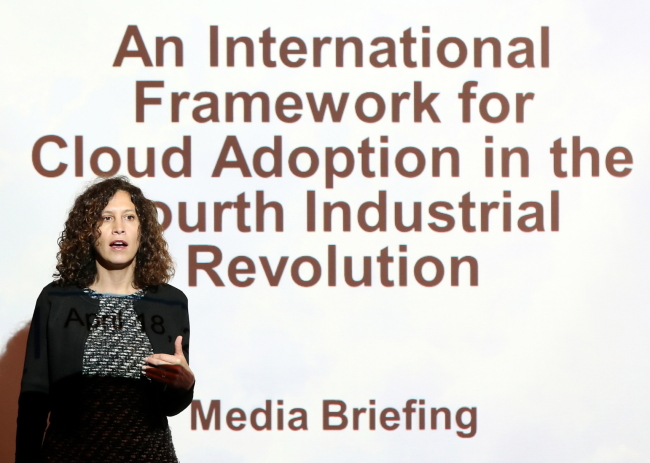South Korea ranks 12th out of 24 of the world’s top information technology economies in terms of cloud computing readiness, according to the 2018 BSA Global Cloud Computing Scorecard, a bi-annual study that assesses and compares the cloud computing policies of different countries.
Korea’s ranking remains unchanged from that of 2016, suggesting a need for more flexibility in the legal and regulatory environment for cloud services here, BSA said.
BSA is an international software industry trade association with members including Amazon Web Services, Autodesk, IBM, Intel, Microsoft and Salesforce. Every two years, it releases a global report that ranks countries’ preparedness for the adoption and growth of cloud services.
The body assesses countries on seven fronts — data privacy, security, cybercrime, intellectual property rights support for industry-led standards and international harmonization of rules, promoting free trade and IT readiness and broadband deployment.
For Korea, its rankings were weak in some criteria and very strong in others -- an unusual scenario as most countries tend to score high or low similarly across the categories, said BSA President and CEO Victoria A. Espinel in presenting the report in Seoul on Wednesday.
 |
BSA President and CEO Victoria A. Espinel (BSA Korea) |
Korea has more stringent privacy protection policies compared to other states, particularly on the movement of data in and out of the country, making the adoption of cloud computing technologies more difficult as it often involves moving information across borders.
For instance, Korea offers fewer legal bases for the transfer of data out of the country, compared to the European Union’s General Data Protection Regulation that enables data transfers based on certain criteria including contractual arrangement, adequacy determination and legitimate interests.
“It ultimately makes the introduction of technologies built on cloud computing like artificial intelligence, blockchain and virtual reality, in Korea that much more difficult,” said the BSA chief.
The BSA also viewed Korea’s cybersecurity regulations as “overly prescriptive,” noting that products which have already passed international security tests, have to undergo new security tests in Korea, a process which can be repetitive, time-consuming and costly.
“If products that have already gone through stringent international security certification process, have to go through Korean certification procedures again, that can slow the introduction of new tech innovations to the Korean market.” Espinel said.
On the other hand, Korea was deemed to have a strong IP protection system, ranking fifth in the category. Korea was also was also top-ranked in terms of IT readiness and broadband deployment, together with Japan and Singapore.
The BSA chief stressed that cloud computing will enable and facilitate access to new products and services based on next-generation technologies like AI, blockchain, the Internet of Things, VR and quantum computing.
The five top-ranked countries in BSA’s cloud computing readiness assessment report were Germany, Japan, the US, the UK and Australia. In sixth place was Singapore, followed by Canada, Italy, Spain, Poland and Korea.
By Sohn Ji-young (
jys@heraldcorp.com)






![[Herald Interview] 'Trump will use tariffs as first line of defense for American manufacturing'](http://res.heraldm.com/phpwas/restmb_idxmake.php?idx=644&simg=/content/image/2024/11/26/20241126050017_0.jpg)
![[Exclusive] Hyundai Mobis eyes closer ties with BYD](http://res.heraldm.com/phpwas/restmb_idxmake.php?idx=644&simg=/content/image/2024/11/25/20241125050044_0.jpg)
